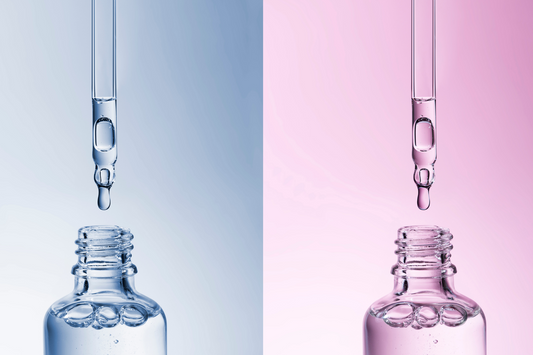Over the past two years, we’ve all had enough to deal with without having to worry about hair loss. Forced to grapple with the COVID-19 pandemic and the stressors it brought along with it, many were presented with a perfect storm for hair loss: Chronic stress from physical, emotional, and economic anxiety. Perhaps not surprisingly, many have reported hair loss following a COVID-19 diagnosis, but many have also reported hair loss without an acute illness of their own. What are the causes, and what are the potential solutions? Read on to learn more.
Can COVID-19 lead directly to hair loss?
Yes. Temporary hair shedding—known as telogen effluvium—can be brought on by any number of stressful life events or lifestyle changes. These can include direct causes like severe illness from a virus or other infection, including the inflammation, fever, and other burdens placed on the body, as well as changes in diet and nutrition or more noticeable events like childbirth and any accompanying postpartum depression.
COVID-19 certainly fits the bill as a severe illness. According to the American Academy of Dermatologists, temporary hair shedding in the months following a recovery from a high fever is fairly common. Compared to other common illnesses, COVID-19 adds to that burden by placing additional stress and strain on the body.
General practitioners and dermatologists in New York and New Jersey are reporting that patients, particularly those dealing with chronic symptoms of long COVID, are experiencing COVID hair loss. In a study that followed COVID-19 patients for 6 months after being discharged from the hospital, COVID hair loss was the 3rd most commonly reported symptom, with roughly 22% of patients noticing visibly thinning hair.

Can COVID-19 lead indirectly to hair loss?
Unfortunately, yes.
As we’ve mentioned, the temporary hair shedding often brought on by COVID-19 can also be caused by the knock-on effects of the pandemic. While hair loss from a virus like COVID-19 is known, these secondary causes can often fly under the radar.
It’s known that emotional stress can bring on bouts of telogen effluvium—recently, studies have shown that particular stress hormones impact the rate at which the hair follicle cycles through the growth cycle—and whether you’ve caught a case of COVID or not, the pandemic has brought on multiple sources of stress that can easily lead to hair loss.

Stressful life events brought on by COVID-19 can include:
- Job insecurity.
- Economic instability, including paying for housing, food, and healthcare.
- Depression and anxiety due to disrupted habits and social gatherings..
- Feelings of isolation and loneliness.
- Health issues in family members, friends, and loved ones.
How to manage COVID-related hair loss
When it comes to the type of hair loss commonly associated with short-term illnesses or temporary stressors, there is hope. As noted by Massachusetts General Hospital’s Hair Loss Clinic, temporary hair loss from telogen effluvium tends to resolve on its own within a few months. The most important factor in resolving stress-related telogen effluvium is to make sure that the underlying stressor is addressed and resolved as best as possible. In the case of any hair loss directly related to a bout of COVID-19, this may be difficult to control. Even many of the secondary, indirect effects—like job insecurity or any continuing economic uncertainties—may be beyond our power to change.
However, many of the secondary effects of COVID-19 can be addressed. If you’re concerned that issues like poor diet, stress, or mental health issues may be contributing to your hair loss, take time to speak with your doctor and develop a plan. Possible steps may include:
- Improving your dietary regimen with more nutritious foods.
- Reducing stress by engaging in enjoyable activities and taking time to relax when possible.
- Practicing yoga or mindfulness meditation.
- Speaking with a therapist or other mental health practitioner to make sure that any underlying stressors and anxieties are addressed.
Though it never helps to hear it, patience is often the best practice in the case of sudden hair loss. It may take months to grow back to the length it was before, but hair regrowth should begin after a few months
Looking for solutions following prolonged hair loss in a post-pandemic world?
If you’re noticing prolonged hair loss after several months have passed, it could be time to investigate other possible causes for your hair loss besides a viral infection like COVID-19.
As always, reach out to your doctor to see if any other underlying or undiagnosed conditions could be exacerbating your hair loss. In some cases, your doctor may make a formal recommendation or write a prescription to begin a particular hair loss treatment that’s right for you.
If you’re looking to jumpstart your post-pandemic hair regrowth journey without spending months waiting around, take a look at our Hair Revival Serum. It revives dormant hair follicles and works to increase the appearance of thicker, fuller-looking hair—in fact, 82% of our trial participants saw a visible boost to their hair in just 6 weeks. Fight back against COVID hair loss with Revela.




